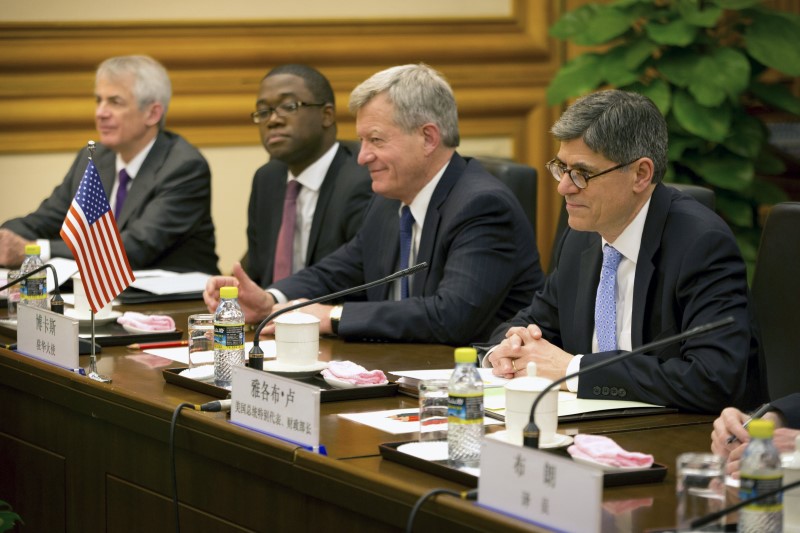BEIJING (Reuters) - China has agreed to delay implementing new bank technology restrictions that Washington has complained represent unfair regulatory pressure on foreign firms, a senior U.S. Treasury official said in Beijing on Monday.
China said this month work was ongoing on a draft anti-terrorism law that would require foreign companies to hand over encryption keys and otherwise facilitate Beijing's ability to bypass security measures, triggering U.S. protests. Another set of financial sector regulations would push China's state-owned banks to buy technology from domestic vendors.
Beijing is now delaying the regulations that applied to the banks, according to the official, speaking after meetings between U.S. Treasury Secretary Jack Lew and senior Chinese officials, including Premier Li Keqiang.
There was no immediate comment from China, but U.S. industry groups, which have been lobbying hard on the issue, cautiously welcomed the move.
"We are encouraged that there seems to be a delay; what we now need is a transparent, open consultation process with stakeholders and we're hopeful that will be part of the next steps," said U.S. Chamber of Commerce executive director for China Jeremie Waterman.
BSA The Software Alliance, whose members include Adobe Systems (NASDAQ:ADBE), Apple Inc (NASDAQ:AAPL), IBM (NYSE:IBM), Microsoft Corp (NASDAQ:MSFT) and Oracle Corp (NYSE:ORCL), and the Software and Information Industry Association, which represents financial institutions and tech companies including Google Inc (NASDAQ:GOOGL) and Thomson Reuters, also found the news encouraging.
SIIA senior director for international public policy Carl Schonander said the delay was a positive development, noting the industry asked for the rules to be suspended.
"We have to see what this means in practice," he said. "We definitely would like to see the draft bank regulations published and we'd like to have the opportunity to provide input to this."
Lew earlier said the issue needed to be resolved because even having the rules pending created a difficult environment for U.S. firms in China.
"We made clear that suspending them is the right approach," Lew told reporters.
While the policy applied to both domestic and foreign firms, it is seen largely benefiting domestic players.
The rules issued by China's banking regulator would restrict the kinds of computers and equipment purchased by the Chinese banking industry to ensure that they meet "security and controllability" requirements, seen as a way to make Chinese banks buy "indigenous" software applications.
"We have already made clear our concerns regarding forced technology transfer and other attempts to bar technological competition, most recently in the banking sector, and I look forward to further discussion today," Lew said, in remarks made during a meeting with Vice Premier Wang Yang in Beijing.
The U.S. government has complained of industrial espionage by Chinese firms against its companies, saying it is often backed by government agencies including the Chinese military.
Beijing denies the allegations.
Earlier, Lew said the United States looked forward to China deepening its financial reforms, in particular its management of the exchange rate.
"As part of these reforms, it is critical that China continue to move to a more market-determined exchange rate and a more transparent exchange rate policy," he said.

China's move towards a more market-driven exchange rate could help its bid to get the yuan included in the International Monetary Fund's special drawing rights (SDR) basket, the Treasury official said. The official added that Washington will continue to press against any unfair intervention in the China's yuan, particularly if there was upward pressure on the currency.